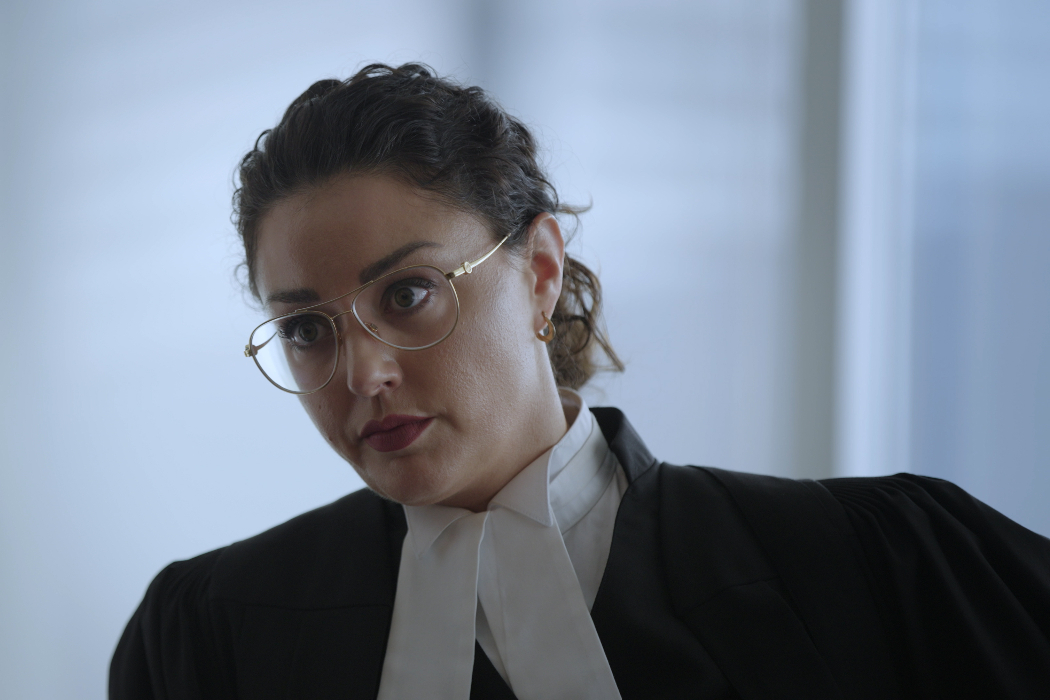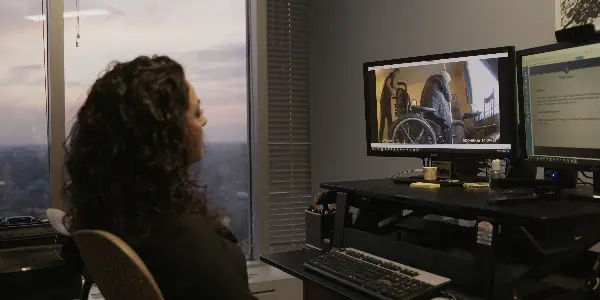STOLEN TIME: Elder Justice Doc Will Break Your Heart

Film critic, Ithaca College and University of St Andrews graduate,…
One of life’s cruelest inevitabilities is that the people we love most grow old and die. And unfortunately, the final years of our lives also happens to be when we’re at our most vulnerable — when our minds are slower, our memories faded and confused, and our bodies infirm. And where there are vulnerable people, there are greedy private equity firms circling like vultures. In Stolen Time, Canadian personal injury lawyer Melissa Miller is trying to fight against rampant negligence and abuse against elders and help the people who can’t help themselves.
Miller and her colleagues at Howie, Sacks & Henry have been suing for-profit nursing homes since 2018 and have amassed hundreds of clients. Miller’s opponents are billion-dollar companies like Extendicare, Revera, and Sienna Senior Living. Throughout Canadian filmmaker Helene Klodawsky’s brisk documentary, Stolen Time, we see the day-to-day workings of Howie, Sacks & Henry and learn about Miller’s cases. The first case we hear about is a woman whose father’s nursing home upped his medication to the extent that he regularly became sedated and stopped eating, drinking, or moving. This practice is called “chemical restraint,” or a “chemical straitjacket,” and understaffed or negligent nursing teams have long relied on it to keep elders sedated and compliant, in some cases misdiagnosing people as being schizophrenic to get around legal protections for elders and justify using the drugs. That story is one of many woven throughout Stolen Time, textured by insightful interviews with researchers and activists to successfully paint a troubling portrait of elder care in Canada and the grueling but necessary legal battle to change it. Between this and Long Live My Happy Head, about an artist who died of brain cancer six months after his film premiered, I feel it’s become my cosmic duty to report on great new documentaries that are also sad as hell.
Canada’s Long-Term Health Care Crisis
For many people, elder health care was horrifyingly thrust into the spotlight during the coronavirus pandemic, which exposed the abhorrent conditions facing many long-term care homes due to chronic underfunding and staffing problems. By June 2020, Canada’s Public Health Agency confirmed that 4 in every 5 COVID deaths in the country were in a long-term care home. Over 4,000 seniors in care homes died during the first wave of the pandemic in Quebec alone.
Also informing the background of the documentary is Bill 175, which the Ontario government debated and ultimately passed in the middle of the pandemic, with little advance notice given to concerned voters. The bill served to further privatize Ontario’s long-term nursing care facilities, allowing for-profit companies to make decisions on services and standards with no regard for public opinion. We see the bill protested in the documentary, at a demonstration during the pandemic that Miller spoke at. Klodawsky might be focused on Miller and her cases, but it urgently depicts the ways in which Canadian health care policy has been taken away from the people it serves.
Miller Versus Goliath
Many of the cases Miller takes on are low-payout cases that most lawyers don’t take on. We all know why this is the case. Society often strips away agency from the elderly, alleging that elderly people don’t know what’s going on and can’t remember anything and that, therefore, nursing homes can take advantage of them without fear of legal punishment. Miller is not only fighting the enormous billion-dollar companies that run these nursing homes, each case the equivalent of hacking off one head of the hydra, but she’s also fighting societal forces like ageism and prejudice against the disabled.
We learn about homes that are chronically understaffed — one home didn’t have a registered nurse on duty for about 100 days, so there was nobody who could care for residents’ wounds. Another home kept continence products (i.e. diapers) behind a locked door and took up to a week to administer those products to people who needed them. One woman living in a care home had a hole the size of a fist in her back for a year and a half before anyone in her family heard about it. We learn about the widespread issue of advanced periodontal disease in homes because attendants cannot conduct thorough basic care checks — some residents, an anonymous dental hygienist tells us, haven’t taken out their dentures in years; many have rotted, broken, or decayed teeth; and in many cases, poor oral health exacerbates conditions like arthritis, heart disease, and Alzheimer’s. “People shouldn’t die of dirty teeth,” says the specialist. “But that’s what we’re seeing.”

Many cases involve negligent staff or verbal abuse, but unless she’s dealing with assault cases, Miller says, she prefers not to name specific carers or nurses. The blame lies ultimately with the corporations who ignore resident complaints, ignore allegations of abuse, and refuse to put more money into providing adequate care at their homes. The film’s most affecting scenes are when Miller speaks with her clients, who understandably find it difficult to focus on specifically written legal arguments when they’re talking about the severe illness, injury, or death of a loved one.
Melissa Miller Is the Most Charismatic Person Ever
Miller fits the role of a heroic lawyer beautifully, and it’s hard not to root for her and want to support elder rights when we see the mountains of evidence and a few of the hundreds of cases she’s assembled against these health care giants. A scene where a thousand-page document is given to her team during discovery will likely make audiences think of legal thrillers like Erin Brockovich or Dark Waters — and like the toxic contamination dramatized in those films, elder abuse and systemic negligence are the dreadful reality of our health care systems. Whether you’re in Canada, the U.S., the U.K., or farther afield, you will at some point have to put your faith in a system that cares more about profit motives than about your wellbeing. The worst part is that no one thing caused this — every year, some new mildly heinous act pushed us further and further into the pit we are in now, like the passing of Bill 175 or the development of barbaric methods like the chemical straitjacket, until finally we looked up and realized we were in a pit 20 feet deep that our representatives, private equity firms, and billionaires dug for us, and instead of a rope to get us out, they’re offering to sell us an even deeper hole.
Most of the people in long-term care, Miller says, at one point likely felt that they would rather die than surrender to the cold, uncaring mercy of a broken health care system. But, as she reminds us, it’s “not as if you have an option.” And Adam Wagman, one of her senior partners, whose own father was diagnosed with a brain tumor three months before filming, solemnly replies, “At some point, you probably don’t.”
Conclusion
I’ve spoken a lot about the issues that Stolen Time depicts and not much about its execution — as many critics are wont to do when a documentary’s content resonates with them more than its filmmaking. Make no mistake, this is a great documentary, equally informative and poignant, and it will make you incredibly anxious about the people you love most. The documentary has its weak points, to be sure — several animated segments are a puzzling inclusion that didn’t resonate with me, personally, and much of the material from the talking heads outside of the law firm and its clients went in one ear and out the other. But that’s less to do with the importance of their words than it is to do with the sheer charisma of Miller, who outshines all other characters as a captivating speaker and central figure in this story. Some people simply demand to be the center of a documentary, and Miller is one of those great subjects — someone so dedicated to her work and so relentlessly busy that, when an hour in you find out she has a painting hobby, your mind is blown at how she possibly finds the time.
I have several family members who are in, have been in, or will likely be going to long-term care homes. I hope they never experience anything like what happens in Stolen Time. I can’t imagine visiting a relative and seeing them get weaker and less confident over time and eventually lose that sparkle in their eye. But if I needed to sue the pants off a negligent nursing home, there’s no one I’d rather have in my corner than Miller.
Stolen Time is now playing in some cinemas and is available to rent or purchase online.
Does content like this matter to you?
Become a Member and support film journalism. Unlock access to all of Film Inquiry`s great articles. Join a community of like-minded readers who are passionate about cinema - get access to our private members Network, give back to independent filmmakers, and more.
Film critic, Ithaca College and University of St Andrews graduate, head of the "Paddington 2" fan club.













